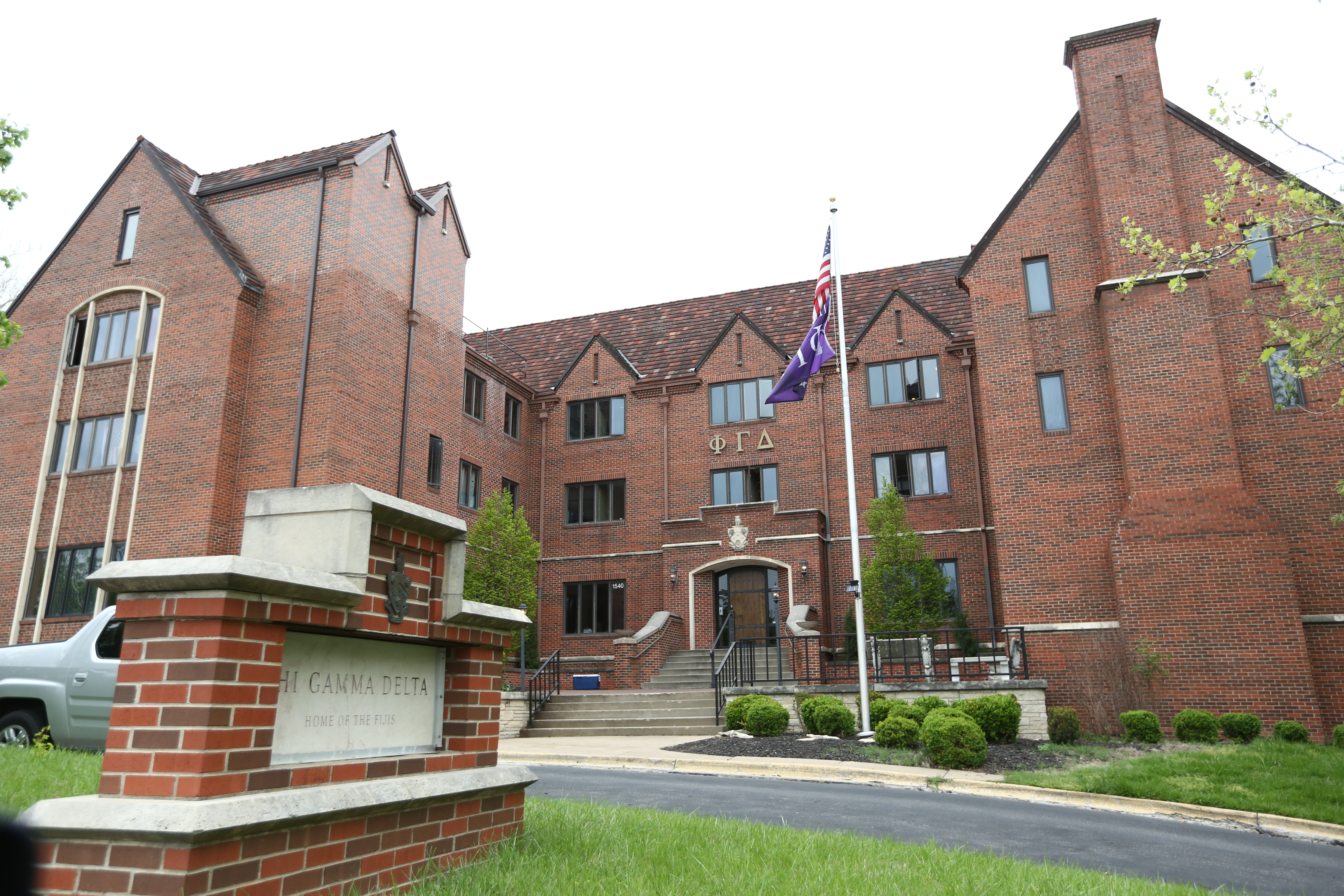Hazing report alleges ‘exceedingly dangerous’ alcohol abuse, images of dolphin slaughter, homophobic slurs; KU won’t release some details

The Phi Delta Theta fraternity house at 1621 Edgehill Road, just off the University of Kansas campus.
University of Kansas leaders are alleging that “exceedingly dangerous” levels of “forced alcohol consumption” are among the hazing practices of a recently suspended fraternity, but thus far KU won’t release details about those incidents.
The Journal-World specifically is seeking more information about an incident connected to the Phi Gamma Delta fraternity, where seemingly an individual had his head covered with a pillowcase and was struggling to breathe.
Multiple documents provided to the Journal-World through an open records request included an allegation from an unidentified new member of the Phi Gamma Delta fraternity involving a pillowcase incident.
“I was getting lightheaded and tried to tilt my head down in order to get the pillowcase off my face for a good breath, but was told to tilt my head back up and yelled at as consequence,” according to a KU summary of testimony provided by the new member.
What led to the new member having a pillowcase cover his face, however, is unclear because the preceding nine lines of text in the KU report were redacted before it was provided to the Journal-World.
The Journal-World on Wednesday morning asked university officials whether any of the redacted information in the report alleged that the person with the pillowcase over his face also was subjected to forced alcohol consumption. On Wednesday afternoon, a university spokesman declined to provide more information about the pillowcase incident, or any incident involving forced alcohol consumption. The spokesman cited privacy concerns related to federal education law.
A leader at the national headquarters for the Phi Gamma Delta fraternity has not returned a phone call from the Journal-World. Two KU students who have been listed as recent presidents of the local chapter of the fraternity also have not returned phone calls seeking comment.
Phi Gamma Delta was one of two fraternities that were sanctioned Tuesday by KU for alleged hazing activities and other violations of university conduct codes. Phi Delta Theta fraternity also was sanctioned by the university. As part of the sanctions, both fraternities had their status as a “registered student organization” immediately suspended for a period of five years. That loss of status means neither fraternity can “operate on the University of Kansas campus or in any way associated with the university, including recruitment of current or prospective KU students or the use of materials of any form associating the chapter name with the university.”
Both fraternities have 30 days to appeal the sanctions and suspension to a university-run judicial board. An executive with the national headquarters for Phi Delta Theta said via email that the fraternity was continuing to “work through its process to determine final outcomes regarding the chapter and its members.” The representative did not answer a question on whether the fraternity intends to appeal the sanctions.
Alcohol allegations
The Journal-World received more than 30 pages of redacted documents related to the inquiry into Phi Gamma Delta; however, the Journal-World could not find any descriptions related to the “forced alcohol consumption” that is alleged.
But Tammara Durham, vice provost of student affairs for KU, highlighted the forced alcohol consumption in her summary of why she ultimately decided to suspend the fraternity for five years. In her summary, she seemingly describes the activity that led to forced alcohol consumption, but that portion of the document was redacted before it was provided to the Journal-World. Other unredacted portions of Durham’s summary highlighted the amount of danger the forced alcohol consumption created.
“This largely undisputed level of forced alcohol consumption is exceedingly dangerous and is reflective of the dangerous systemic hazing taking place within Phi Gamma Delta,” Durham wrote.

photo by: Nick Krug
Phi Gamma Delta, 1540 Louisiana St.
But despite the dangers, Phi Gamma Delta technically was not cited for a violation of university alcohol policy. Durham’s letter seemed to point out a loophole that exists in KU’s current alcohol policy. Durham said Phi Gamma Delta could not be cited for violating the university’s alcohol policy because the alleged incident happened inside the Phi Gamma Delta house.
“However, the university’s alcohol policy indicates its applicability only on KU’s campus and at KU-sponsored activities,” Durham wrote. “As the forced alcohol consumption documented in the hearing occurred in the Phi Gamma Delta house and was not a KU-sponsored activity, university policy requires me to find the chapter not responsible for violating the university’s alcohol policy.”
While the report doesn’t provide details of the forced alcohol consumption, it goes into detail about other hazing incidents, including one that has been labeled as “tacoing.” The KU report said a third-party investigator hired by Phi Gamma Delta found evidence that fraternity members would come back to the house after drinking at bars or other events to “taco” members. That form of harassment involved having a new member “stand or lie on his mattress and then rolling up both sides so he would be the ‘meat inside a taco’ and then sprayed with substances to simulate condiments.”
The new member who originally filed the complaint — a second new member came forward during the course of the investigation as a collaborating witness — alleged that one of his pledge brothers suffered a concussion and was sick for a week after being slammed against a locker as part of a “tacoing” incident.
A dolphin slaughter
KU’s summary report regarding Phi Delta Theta — the other fraternity that was sanctioned — did not highlight forced alcohol consumption. But it did highlight late-night incidents where members came to sleeping areas of new members to “rough up” the new members by “pushing, shouting, jumping on their bed, etc.” An investigation by the national chapter of Phi Delta Theta determined that a new member was injured after falling out of bed during one of the late-night incidents.
The internal investigation by the national Phi Delta Theta did determine that the local chapter had violated the “alcohol-free housing policy” and its anti-hazing policy. That investigation determined that hazing activities were happening one to two times per week at the local chapter, according to KU’s summary of the Phi Delta Theta investigation.
The hazing activities cited by the national organization included “personal servitude,” although the details of that activity were redacted, and required calisthenics that “resulted in physical injury to new members and contributed to sleep deprivation.” One member reported having to sleep in his car on multiple occasions in order to get any sleep as a new member.
But the alleged hazing also focused on mental intimidation, including an allegation that a new member was forced to watch an animal mutilation video. Hearing officers at KU heard testimony that a new member “was required to watch a movie of a dolphin, wherein the dolphin is brutally slaughtered. Active members then used this to nickname the co-complainant ‘Dolphin,’ as the one who is the most hated and should be slaughtered.”
The new member who made complaints about hazing ultimately faced retaliation for making that complaint, according to the summary of the investigation provided by KU. The new member reported being pushed, spit on and having beer bottles thrown at him. He also received several derogatory and threatening messages, including one that used a homosexual slur to describe him, and that also attacked his belief in Christianity. Another said: “I have never met someone in my life that I hate as much as you.”
KU’s summary said the new member ultimately left the KU campus to complete the remainder of his semester remotely, and has sought medical treatment for symptoms he experienced after leaving Phi Delta Theta. Following the fall semester, he transferred out of KU, and has been diagnosed with post-traumatic stress disorder.
Todd Simmons, director of chapter support for the national Phi Delta Theta fraternity, did not specifically comment on any of those allegations, but said via email that: “Phi Delta Theta holds the health and safety of its members in the highest regard and will not tolerate any actions that directly contradict the values and policies of the organization. Such actions will be met with the utmost level of accountability.”
Simmons did not answer a question about whether the organization turned over any of its findings to law enforcement officials for review. A KU spokesman confirmed that KU did not turn over any findings to law enforcement.
Probation instead of suspension?
While it is unclear whether either fraternity will appeal its suspension, the documents show that one university hearing panel was fine with an eight-year probation period for Phi Gamma Delta rather than the five-year suspension that ultimately was handed down.
The three-member hearing panel that received testimony related to the Phi Gamma Delta allegations recommended a five-year closure of the fraternity at KU; however, the committee recommended that closure sentence be suspended if the local chapter agreed to an eight-year probationary period. That probationary period would have allowed the chapter to remain open at KU, but would have created new requirements for its oversight.
Durham, though, rejected that recommendation and ordered the five-year closure of Phi Gamma Delta. Durham said she did not believe the university had the ability to place an organization on probation for more than two years.
A separate three-person hearing panel heard testimony in the Phi Delta Theta case, and it recommended only closure, with no option for a probation period.
In both cases, Durham noted that the fraternities had been repeat offenders of KU conduct codes. For Phi Gamma Delta, the latest allegations mark the fourth confirmed instance of hazing in 11 years, while for Phi Delta Theta it marks the fourth case in less than 10 years.
Phi Delta Theta last had a misconduct case that resulted in a fine in October 2020, and was under a university warning as recently as August of 2021. Phi Gamma Delta was under a hazing warning from the university that expired only on Dec. 31, 2021.
While ruling on the two fraternities’ cases separately, Durham used almost identical language in her written rulings to both organizations:
“When nearly 10 years of educational measures fail to change a chapter culture, the university has an obligation to pursue more severe action to uphold the educational environment of the community at large,” Durham wrote.







